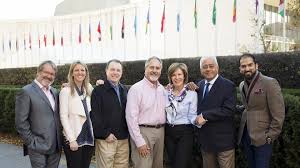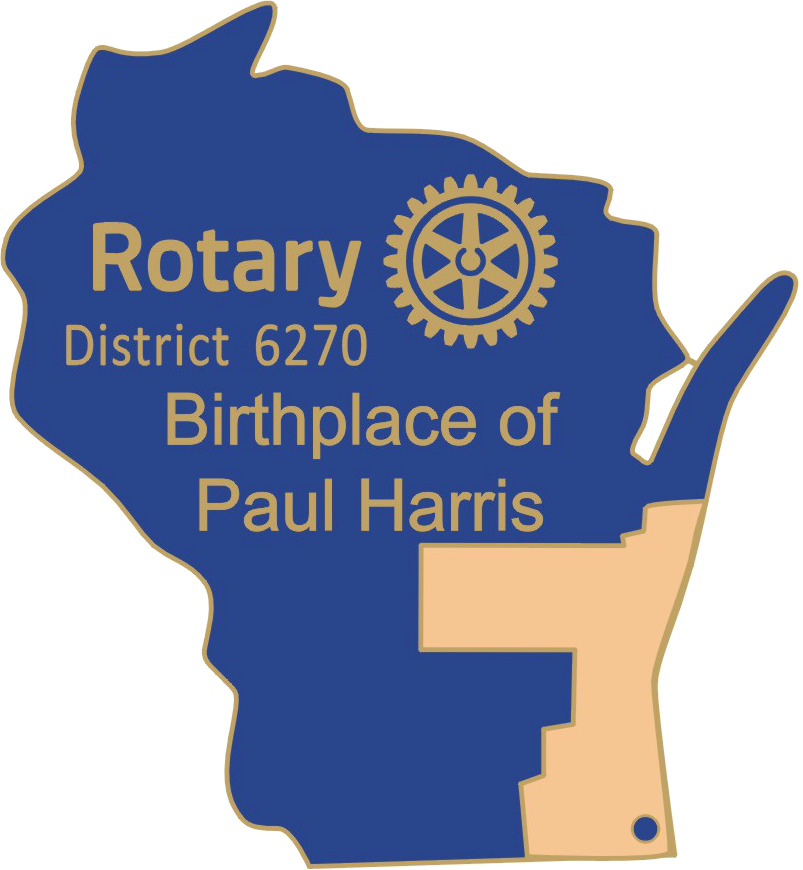A More Peaceful and Just World
Rotary Un-Celebration Mixes
Business With Diplomacy
 Outside the United Nations building in midtown Manhattan stands an imposing sculpture of a man wielding a sword in one hand and raising a hammer with the other. It reflects a shared goal that Rotary and the United Nations celebrated at the organizations' annual meeting on Saturday, 12 November: to use our strengths and tools to build a more peaceful and just world.
Outside the United Nations building in midtown Manhattan stands an imposing sculpture of a man wielding a sword in one hand and raising a hammer with the other. It reflects a shared goal that Rotary and the United Nations celebrated at the organizations' annual meeting on Saturday, 12 November: to use our strengths and tools to build a more peaceful and just world.The theme of this year's Rotary Day at the United Nations, "Responsible Business, Resilient Societies," emphasizes Rotary's role as a global network of business leaders using the tools of their trades to build stronger, more prosperous communities.
In his introductory remarks, Rotary International President John F. Germ drew the crowd's attention to the statue, "Let Us Beat Our Swords Into Ploughshares," as he set the tone for the day, which included breakout sessions and keynote addresses on aspects of responsible business, or the philosophy that for-profit enterprise can contribute to positive social and economic development.
"Here is where the UN and Rotary International are working side by side, equipping communities with the tools they need, and empowering them with the will to use those tools far and wide," he said.
Per Saxegaard, founder and chairman of the Oslo-based Business for Peace Foundation, gave a keynote address on the complex relationship between business and broader society, marked by both tension and opportunity. Despite the perception that profit alone motivates enterprise, he said, commercial success and social progress are closely intertwined.
"Societal needs define markets," he said. "I have met many entrepreneurs and they all have one thing in common: They see a problem, and they say 'I can fix that, and I can do it cheaper and better.' That is the engine of innovation in business. We need that energy to solve the problems at hand," such as hunger or illiteracy. He pointed to the Sustainable Development Goals, the UN's ambitious roadmap for eliminating poverty by 2030 and highlighted the opportunity for businesses to help achieve them.
Other speakers included UN Under Secretary General and High Representative for Disarmament Affairs Kim Won-soo and UNICEF polio chief Reza Houssaini, who provided an update on the polio eradication campaign.
In the afternoon, Rotary member Devin Thorpe spoke about the intersection of profit and purpose. Infusing a corporate program with a sense of social purpose pays off, he says, because it breeds loyalty and satisfaction among both customers and employees.
Per Saxegaard, founder and chairman of the Oslo-based Business for Peace Foundation, gave a keynote address on the complex relationship between business and broader society, marked by both tension and opportunity. Despite the perception that profit alone motivates enterprise, he said, commercial success and social progress are closely intertwined.
"Societal needs define markets," he said. "I have met many entrepreneurs and they all have one thing in common: They see a problem, and they say 'I can fix that, and I can do it cheaper and better.' That is the engine of innovation in business. We need that energy to solve the problems at hand," such as hunger or illiteracy. He pointed to the Sustainable Development Goals, the UN's ambitious roadmap for eliminating poverty by 2030 and highlighted the opportunity for businesses to help achieve them.
Other speakers included UN Under Secretary General and High Representative for Disarmament Affairs Kim Won-soo and UNICEF polio chief Reza Houssaini, who provided an update on the polio eradication campaign.
In the afternoon, Rotary member Devin Thorpe spoke about the intersection of profit and purpose. Infusing a corporate program with a sense of social purpose pays off, he says, because it breeds loyalty and satisfaction among both customers and employees.

